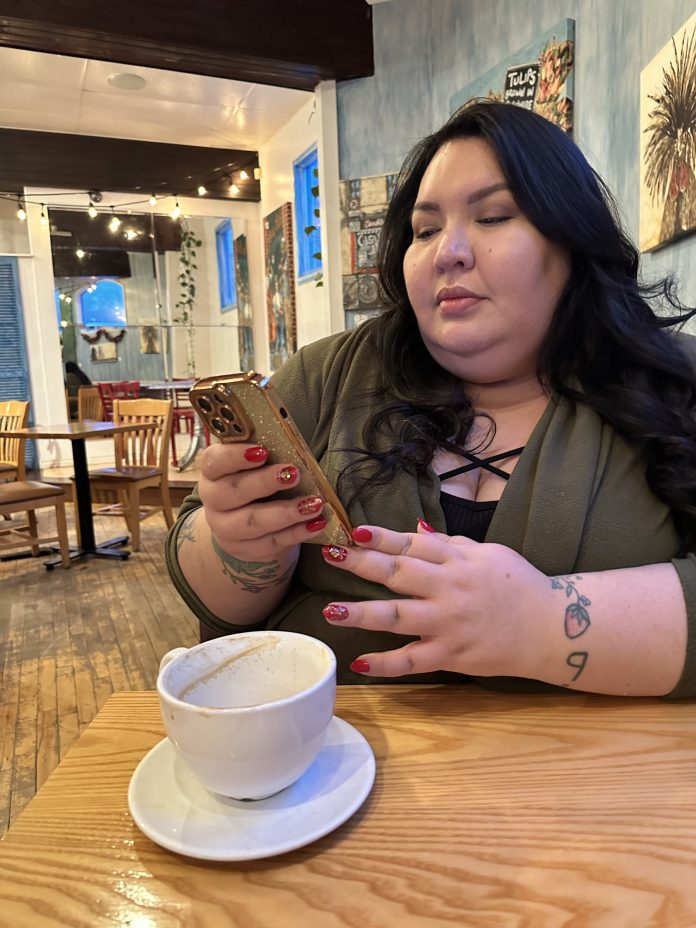
Tenille Campbell named USask Indigenous Storyteller-in-Residence
English River First Nation poet Tensile Campbell has been selected as the University of Saskatchewan’s Storyteller-in-Residence for a 12-week residency with the University Library beginning in January.
Campbell said she’s taking “creative licence with the term Storyteller.” While many people think of storytelling, as particular people telling sacred stories, that’ not her, she said, in an interview with the Northern Advocate..
“I’m more approaching it as ‘how do we tell our stories? How do we share our stories? What stories do we want to tell?’ Especially for women.
“I find my business practice and my art practice focuses on women getting the space to tell their own stories,” she added. “It includes portraiture, it includes polaroid, I might throw a bead night in there. I just learned to bead last year and it’s a new fascination.”
The outline for the residency project has been completed, but not named or filled in at the time Campbell spoke with the Northern Advocate.
The residency is a four-month project, “but if feel like programmes like this never really end,” she says. It just continues on in different forms.
“I think women, learning to say gentle, loving things about themselves is important,” she says. “We’ll see how it goes.”
Part of the Indigenous residency involves a two-week residency at the Frances Morrison Public Library in downtown Saskatoon.
That part of the of her residency had not been defined but, it could be in February, Indigenous Storytelling Month, depending on the scheduling at Frances Morrison.
Campbell is a published poet, with two books, to her credit, #IndianLove: Poems, published in 2017 and Nedi Nezu (Good Medicine) published in 2021 and is in her final year as a PhD student.
“It’s been the longest and hardest product I’ve ever done,” Campbell said
Campbell’s first book is “a collection of Indigenous erotica and storytelling. It’s fun; it’s cheeky.”
Her second book came out during COVID times. It continues the theme of Indigenous Erotica, but also more political and more a little more layered within self-love , politics and a critical eye on both.
Campbell also created and is the owner of sweetmoon photography.
“I specialize in photographing Indigenous people in communities, so I’ve been doing that for over a decade. It’s been great,” she says.
Her PhD is “actually going to be my third poetry book … the focus is actually completely different. It’s about matriarchy and relationships among women and transitions women go through.”
In preparation for the book, she’s read about her mother, 12-year-old daughter, best friends.
“I firmly believe women are community, not competition,” she says. “It’s kind of like love poems still, but love poems of the women who helped me raise my daughter. I feel like it’s one of the most open collections I’ve ever written. Writing about sex is easy. Writing about your feelings, your heart, your child, your mother, leaves you so vulnerable.”
Campbell said she’s still exploring this and is excited about it.
“We’ll see if I can ever read poetry without crying,” she says.
Campbell’s ancestry is Dene from English River First Nation on her father’s side and Métis from the Duck Lake/St. Laurent area of Saskatchewan on her mother’s side.
She describes it as “a rich background.”
The selection of Campbell for the 2024 Storyteller-in-Residence supports the aim of the residency is “uplifting Indigenous voices and promoting intercultural understanding and story-sharing between and among Indigenous and non-Indigenous communities,” reads a University of Saskatchewan news release dated Dec. 5, 2023.
The Indigenous Storyteller-in-Residence program is made possible through University Library donors and the Saskatoon Public Library programming, quoted from the news release.

